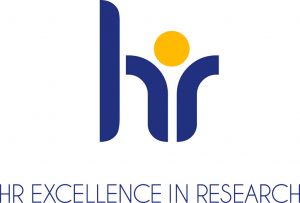General information
The HR Excellence in Research

European Charter for Researchers
The European Charter for Researchers establishes general principles and requirements defining the roles, responsibilities and qualifications of researchers as well as their employers and / or funders. The purpose of the charter is to ensure that the nature of relations between scientists and their employers or funders favors achieving positive results in the creation, transfer, exchange and dissemination of knowledge and technological development as well as career development of researchers.
The Charter also recognizes the value of all forms of mobility as a means to further professional development of scientists. In this sense, the Charter is a framework for researchers, employers and funders, an incentive for them to conduct responsible and professional conduct in the work environment, as well as to warn each other as professionals.
The Charter is addressed to all researchers in the European Union at all stages of a scientific career and covers all fields of research in the public and private sectors, regardless of the position and employment, legal status of the employer or the type of organization or institution where the research is conducted. The charter takes into account various functions performed by scientists, who are not only assigned to conduct scientific research and / or development activities, but also perform tasks related to scientific aid, consulting, management or administration.
The Charter is based on the assumption that the primary obligation of both researchers and their employers and / or funders is to comply with relevant national or regional regulations.
Code of Conduct for the Recruitment of Researchers
The Code of Conduct for the Recruitment of Researchers covers the general principles and requirements that employers and / or funders should follow when appointing or recruiting researchers. The rules and requirements in question should guarantee compliance with such values as transparency of the recruitment process and equal treatment of all candidates, in particular while taking into consideration the development of an attractive, open and sustainable European labor market for researchers and complementing the principles and requirements of the European Charter for Researchers.
The policy of open and transparent recruitment (Open, Transparent and Merit-based Recruitment Policy – OTM-R) is the implementation of these principles in a number of cases, including: providing clear and transparent information on the whole selection process, publishing clear and concise job advertisements with links to detailed information (on e.g. required competences and duties, working conditions, entitlements, training opportunities, career development, gender equality policy), as well as ensuring that the required level of qualifications and competences is consistent with the needs of a given position, and is not a barrier to in the application process.

Increasing the attractiveness of employment at the University, which creates a friendly environment for scientific work and respects transparent rules during employee recruitment;

Recognition of the University as an institution creating the best working conditions in accordance with European standards, for conducting scientific or research and development (R & D) activities;

Ability to publish announcements on the European EURAXESS researchers recruitment platform;

Favor for the University in: international grant competitions of the European Commission in the Framework Program of the European Union HORIZON 2020 in the field of scientific research and innovation; national grant competitions of the National Science Centre and the National Centre for Research and Development; competitions and funding programs for the Ministry of Science and Higher Education.
